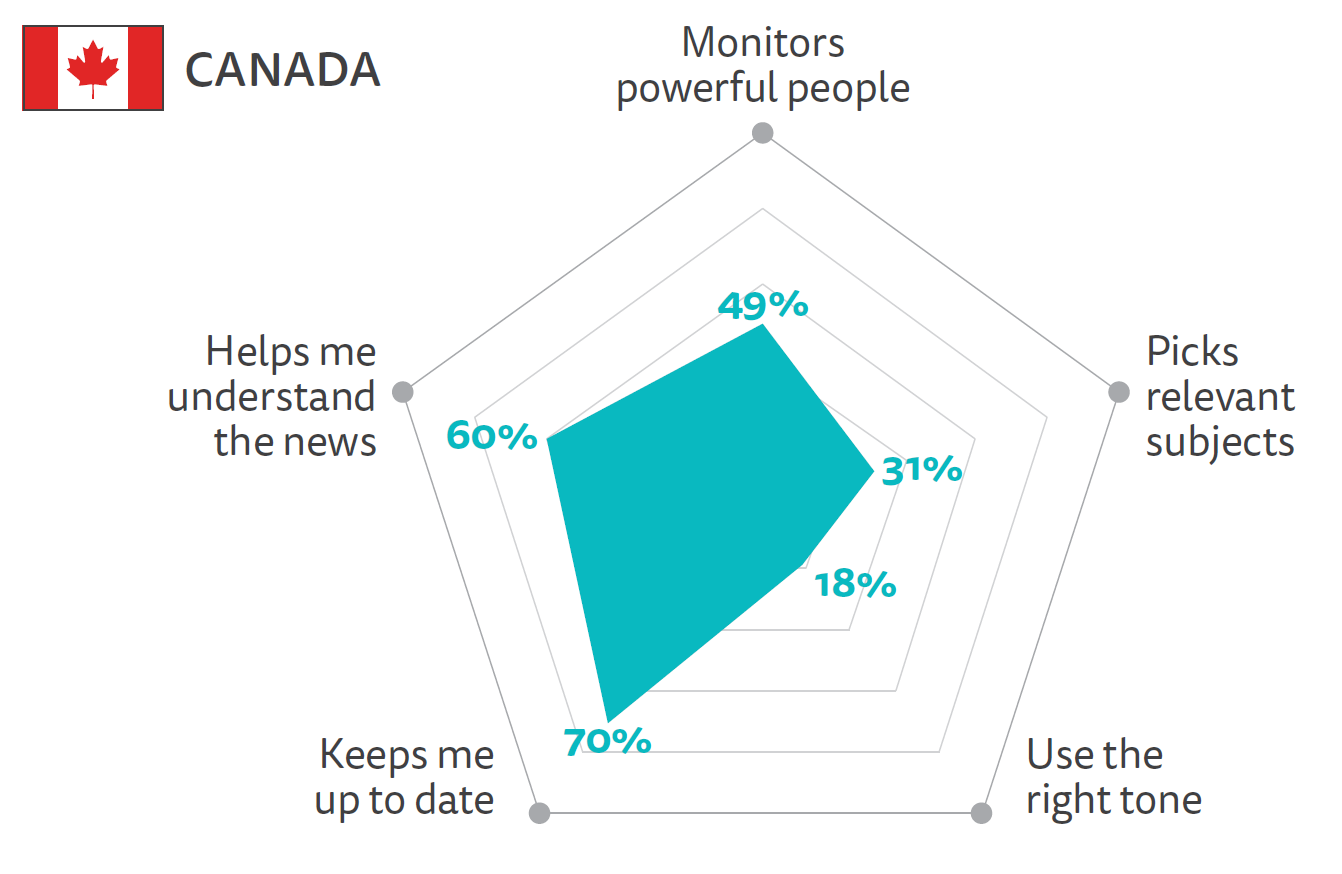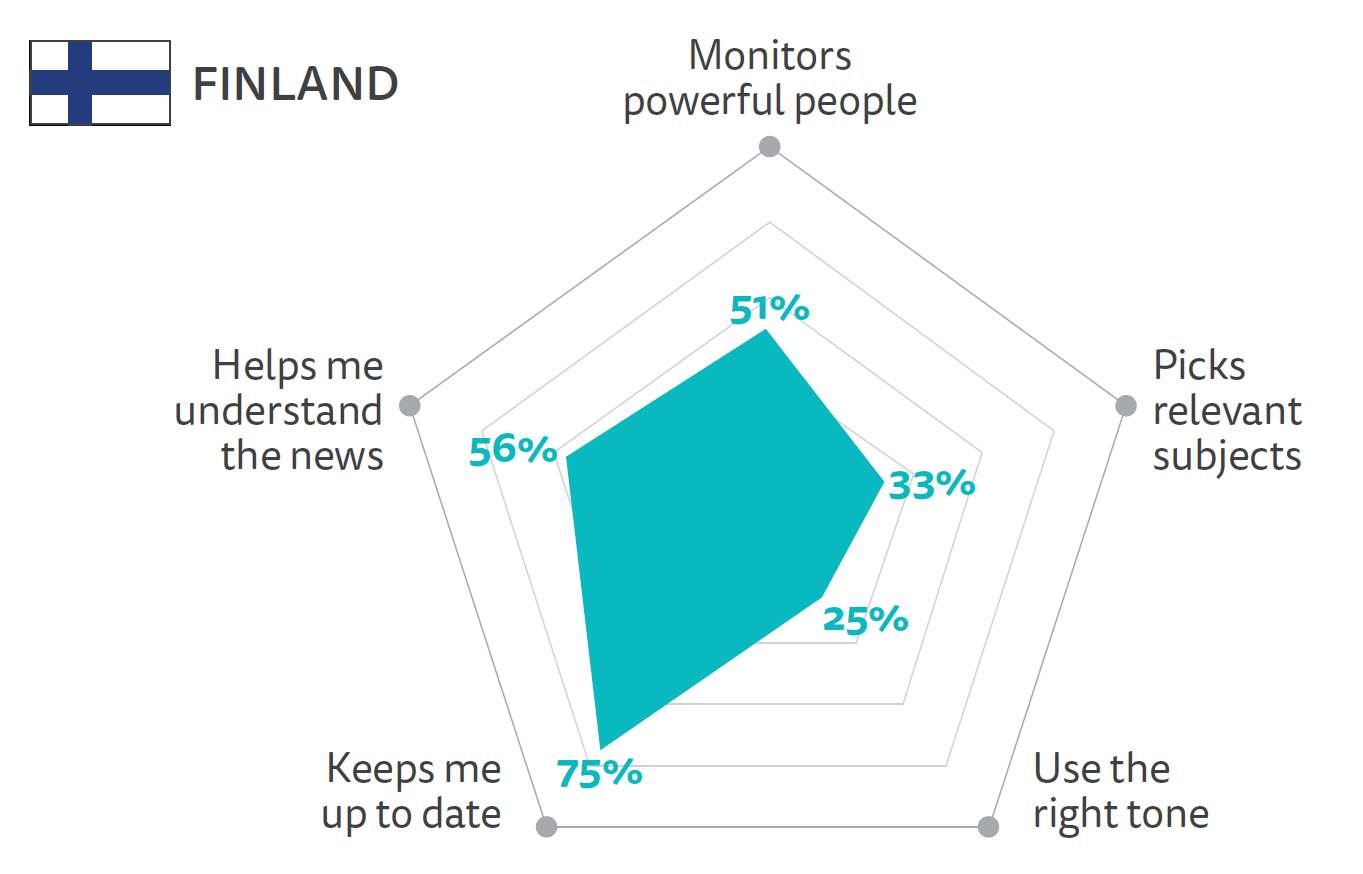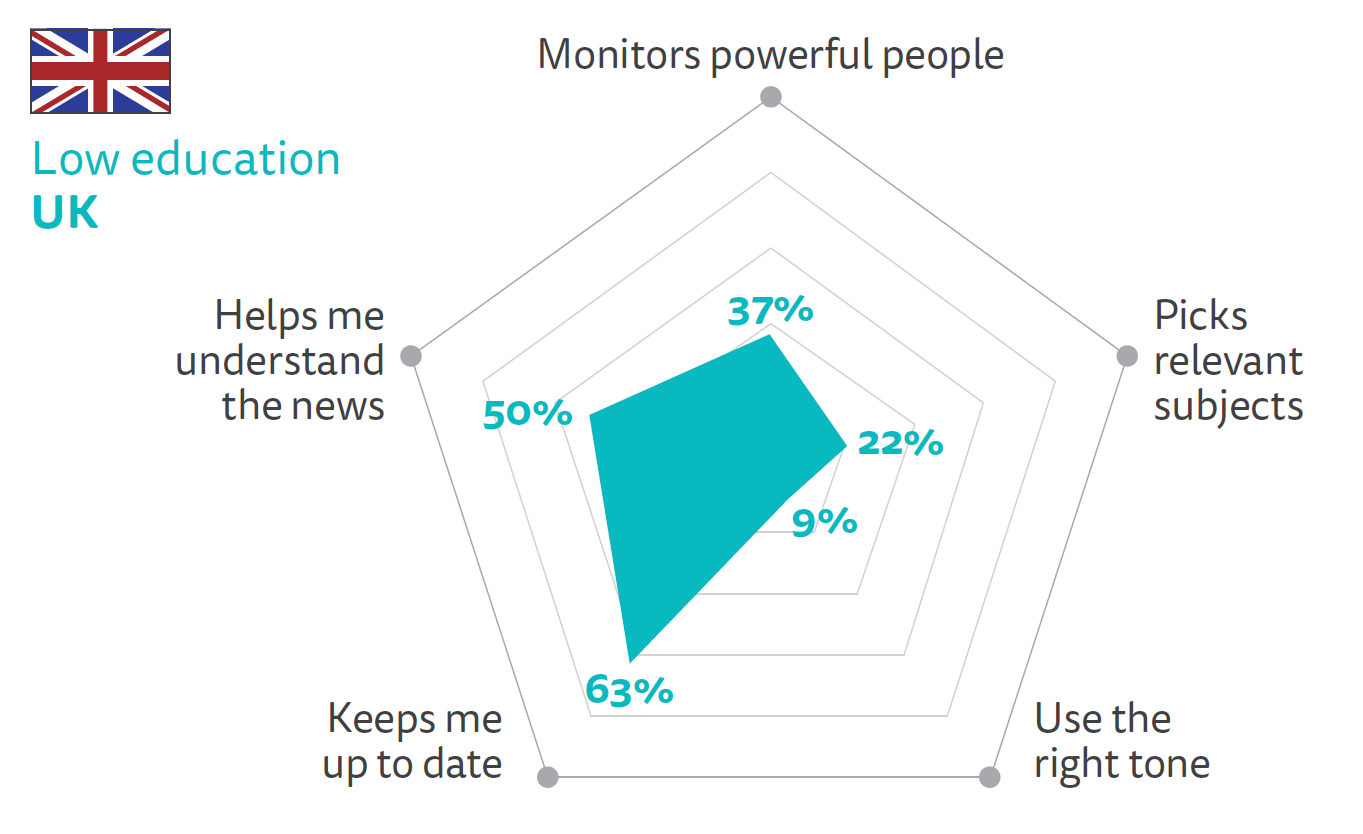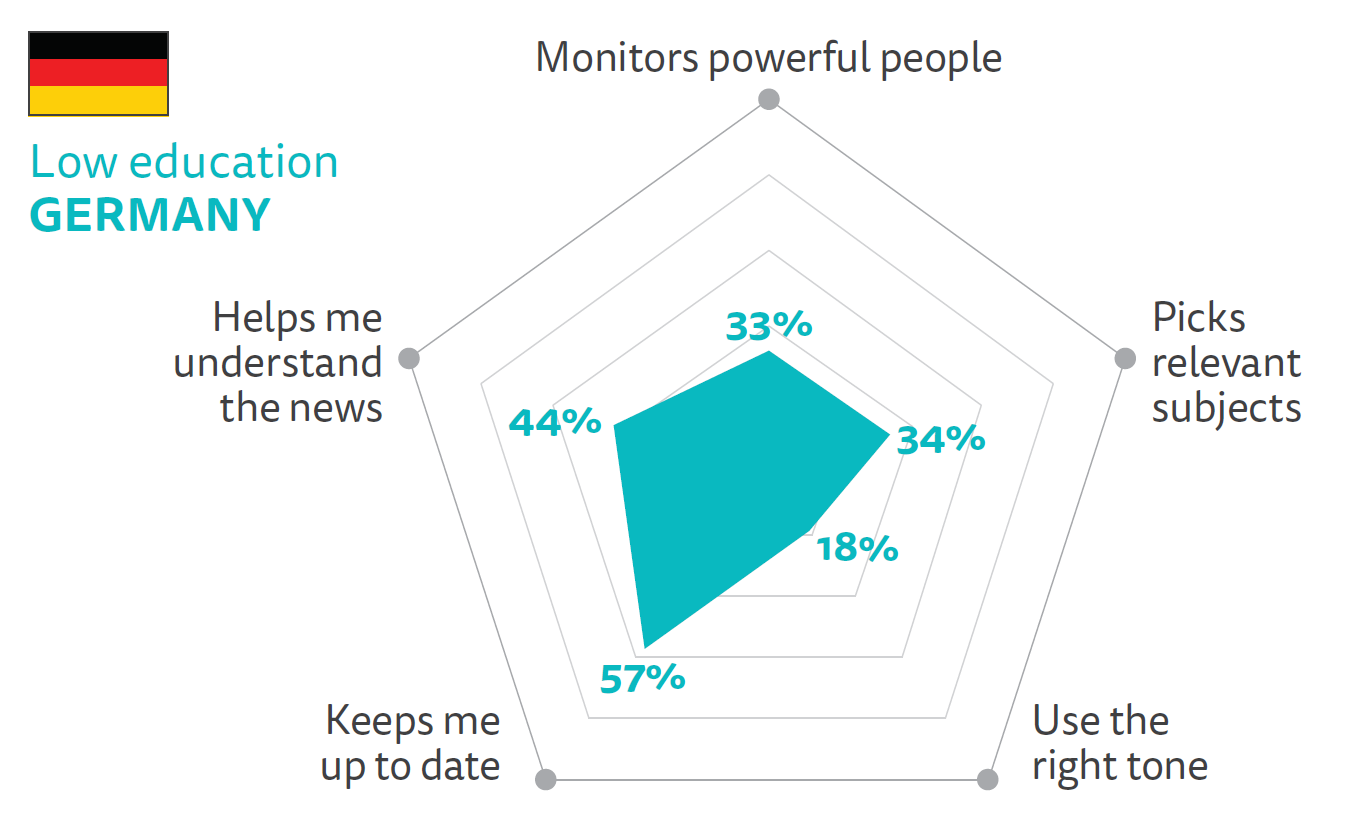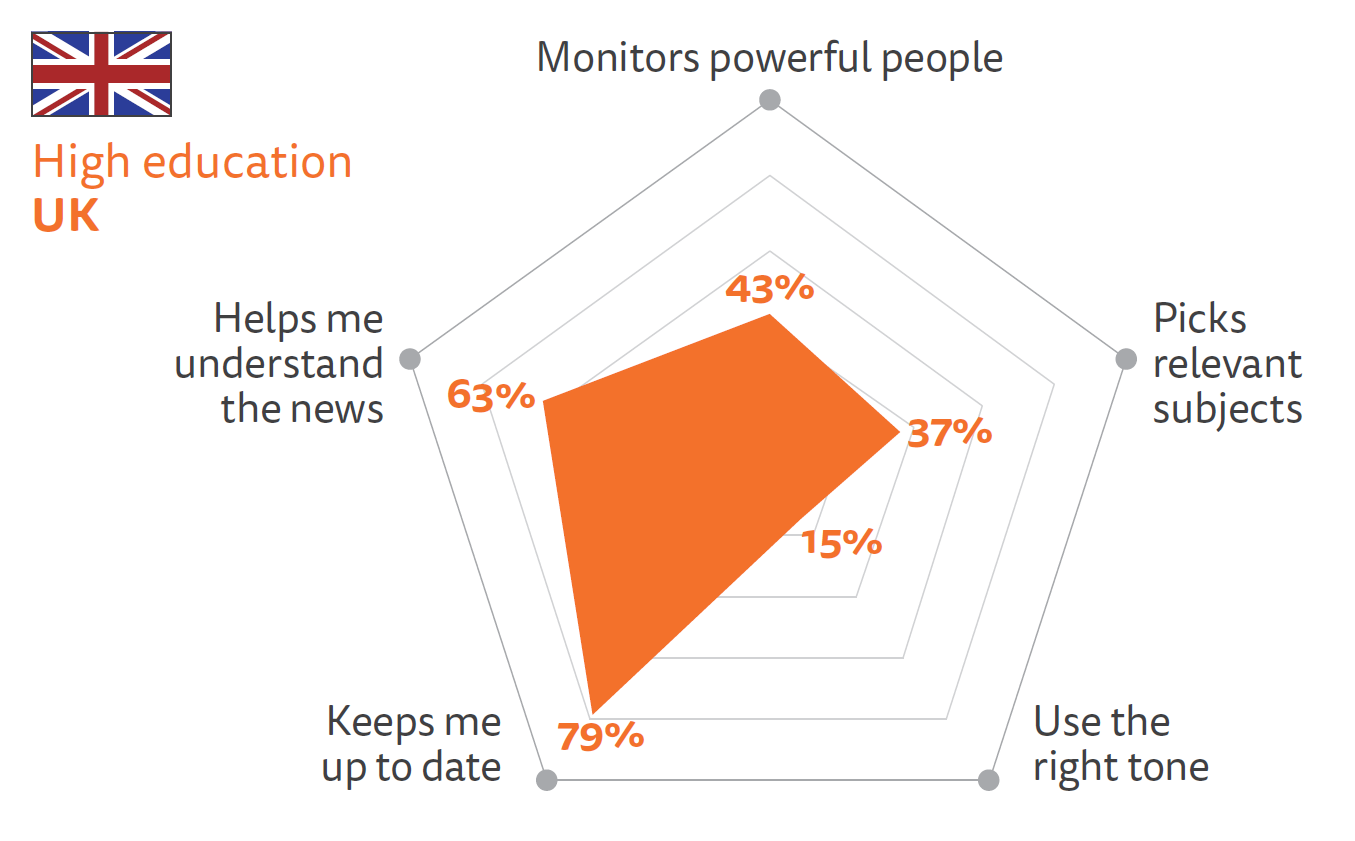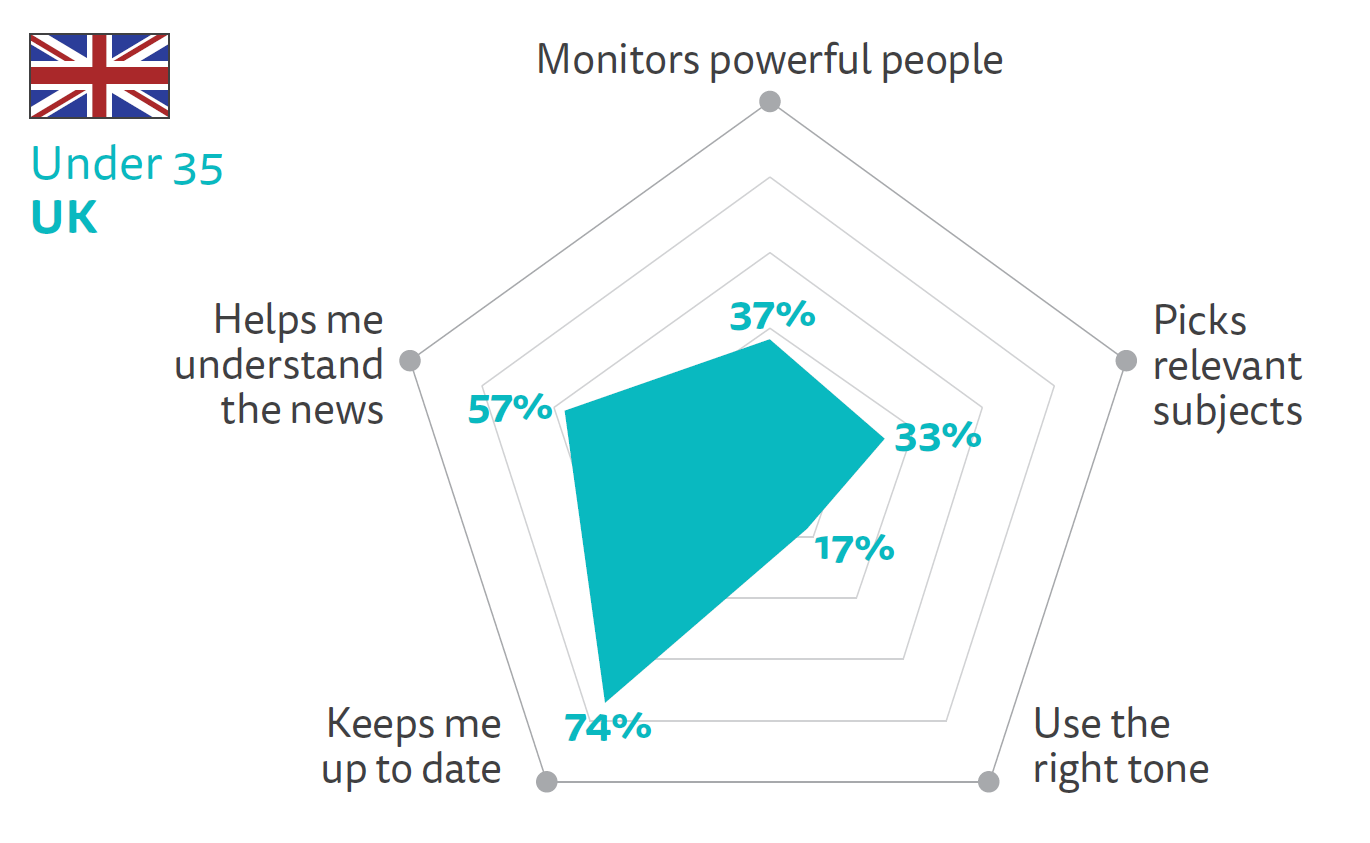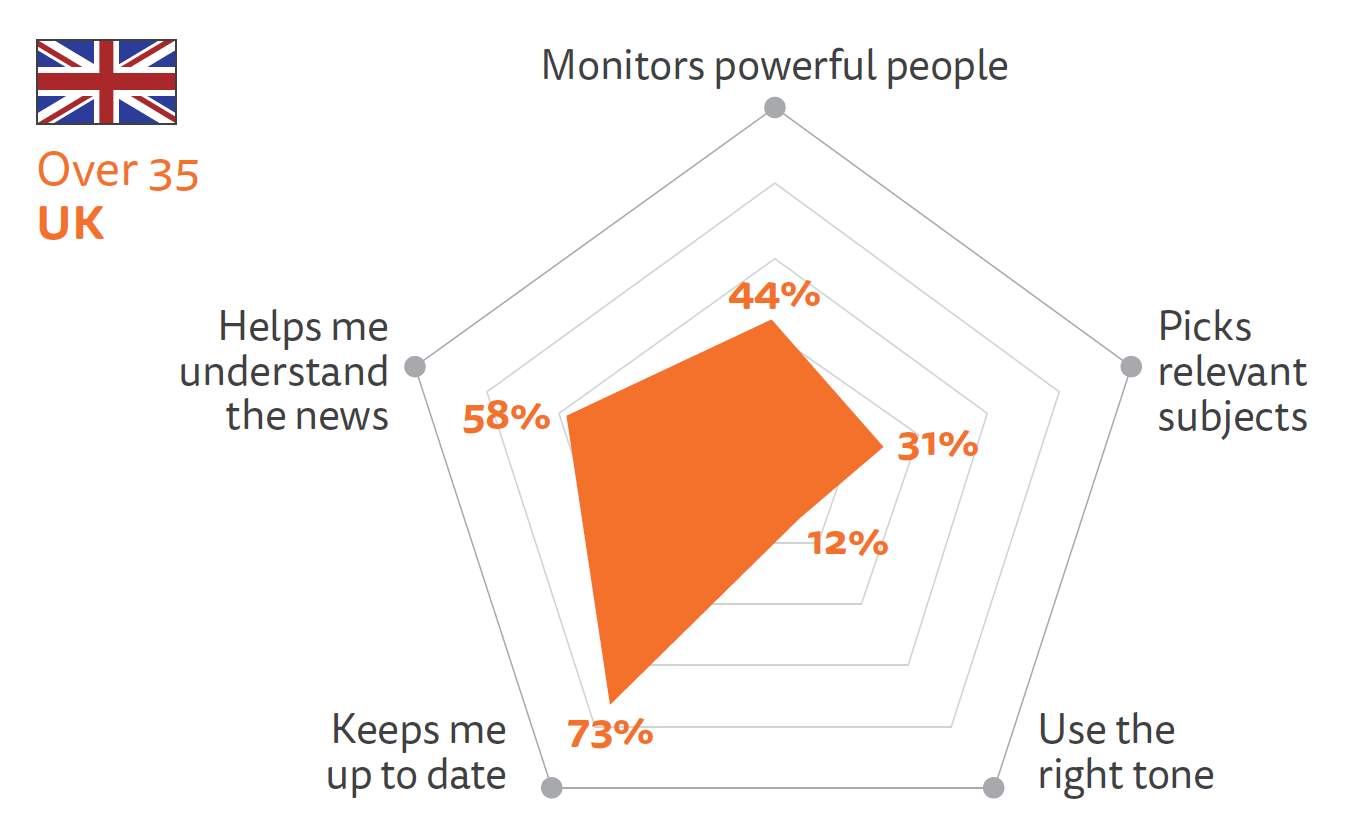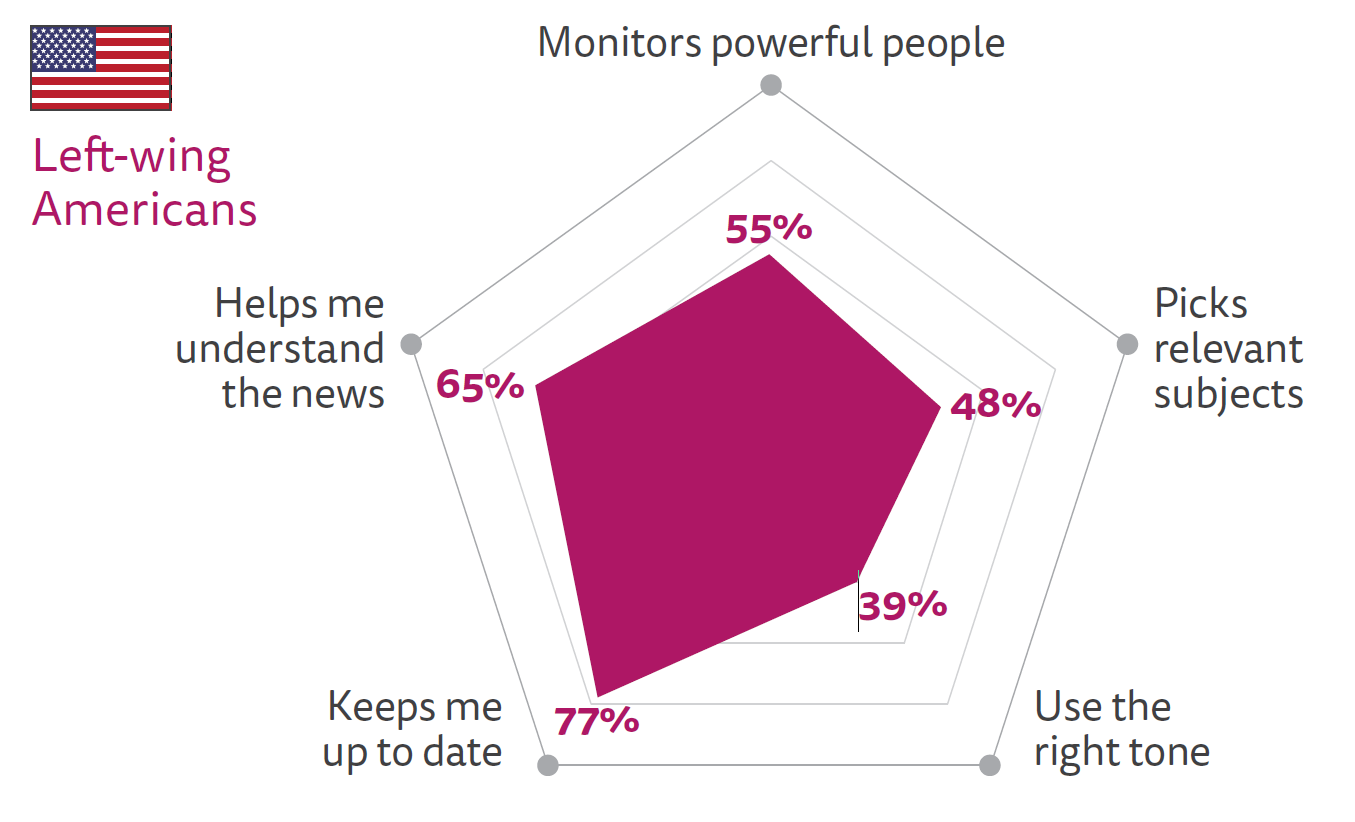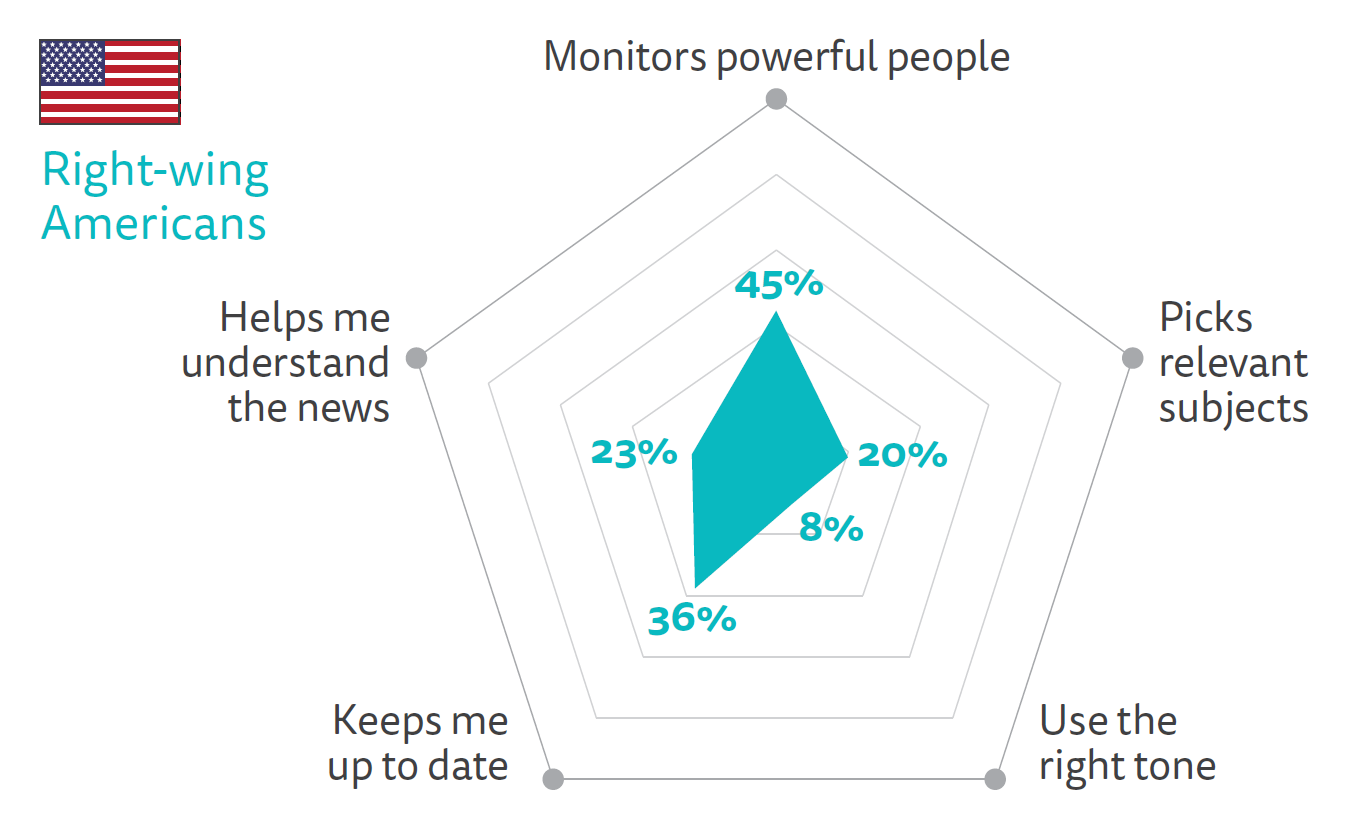The news media rely on their audience both for their public importance and for their economic sustainability. No matter how good reporting may be, if people do not value it, it is unlikely to have a significant impact on public opinion or public knowledge. Similarly, if people find news disappointing, no matter how proud journalists may be of their work, people might be unwilling to pay for it as a commercial product or as a public service. They may also be reluctant to back the news media if political leaders try to crack down on them or intimidate them.
This year we dug a little deeper into people’s attitudes towards news media using a series of questions designed to explore how well they thought they were performing. More specifically, we asked people whether they think the news media fulfil their watchdog role (do the news media monitor and scrutinise political and business leaders?), whether the news media pick relevant subjects, whether they adopt the right tone (are they too negative?), whether they keep the people up to date, and – last – whether they help them understand current events.1
These are all things that the news media generally strive to do well. Many journalists would likely see them as being at the very core of their professional mission – a mission that they would argue the news media delivers on uniquely well. But what does the public think?
News Media do Well at Keeping People Up to Date
In the Executive Summary we saw that, across all countries, most people agree that the news media keep them up to date with what’s happening (62%), and that they help them understand current events (51%). But we should keep in mind that there is a significant minority (10–15%) that completely disagree that the news media help them in this regard – and perhaps equally concerning, around one-third who neither agree nor disagree.
Evaluations of the media along other dimensions tend to be more negative. Under half (42%) agree with the proposition that the news media monitor and scrutinise the powerful, only 29% agree that the news media cover topics that are relevant to them, and just 16% think that the news media use the right tone. Four in ten (39%) think that the news media are too negative. However, it is important to point out that many people do not have a strong view about this, with almost half (44%) selecting neither agree nor disagree.
Attitudes in Different Countries
These aggregate numbers can hide large national differences. Below we use a series of radar charts to display the differences between two countries where respondents have relatively positive attitudes towards the news media (Finland and Canada), and two countries where people are much more negative (Greece and Hungary).
PROPORTION THAT AGREED WITH EACH ATTITUDE TOWARDS THE NEWS
Selected markets
The news media in my country:
Base: Total sample: Canada = 2055, Hungary = 2007, Finland = 2009, Greece = 2018.
In Finland and Canada, roughly half of respondents think that the media do a good job in monitoring powerful people and helping them understand news, whereas in Hungary only one-fifth of respondents (20%) think that the news media fulfil their watchdog role, and a third (33%) that they help them understand the news.
However, even among these edge cases, we find relatively similar attitudes towards the news media’s tone. Only 9% thinks that the news media uses the right tone (in terms of negativity) in Greece, compared to 25% in Finland.
Attitudes within Countries
We can also see differences between groups within countries. If we look at differences by education, in the UK and Germany we can see that those with higher levels of formal education are more likely to evaluate the news media positively along every dimension. Those with lower levels of education are, for example, significantly less likely to say that the news media cover topics that are relevant to them, suggesting that the news agenda is more geared towards the interests and needs of the more educated. This chimes with the criticism that the news media do a better job of catering for people who are most similar to the journalists themselves, and are less able to serve those groups that are less likely to be found in the newsroom.
PROPORTION THAT AGREED WITH EACH ATTITUDE TOWARDS THE NEWS BY EDUCATION
UK and Germany
Base: Low/high education: UK = 558/839, Germany = 596/642.
We might also expect to see differences by age. Older people are arguably more likely to have been socialised with a more positive view of the news media, and with a stronger normative view about the importance of the role that the news media play within society. However, when it comes to age, although the over 35s in Germany do tend to rate the media slightly more positively, in the UK the differences are small.
PROPORTION THAT AGREED WITH EACH ATTITUDE TOWARDS THE NEWS BY AGE
UK and Germany
Base: Under/Over 35s: UK = 413/1610, Germany = 450/1572.
In the US, people’s evaluations are much more likely to be shaped by their political views – reflecting the highly politicised nature of attitudes towards the news media. As illustrated below, right-wing Americans evaluate the news media very negatively – even more negatively than in countries with low trust in the news like Hungary and Greece. Conversely, left-wing Americans are more positive towards the news media than high-trust countries like Finland and Canada. The most striking differences surround attitudes towards help with understanding: 65% on the left think that the news media do a good job in helping understand the news, whereas only 23% of right-wing Americans think the same.
PROPORTION THAT AGREED WITH EACH ATTITUDE TOWARDS THE NEWS BY POLITICAL LEANING
United States of America
The news media in my country:
Base: Left/Right: USA = 504/497
The Association with Trust and Pay
As we alluded to at the start of this section, people’s evaluations of the news media matter because they might be linked to positive outcomes like trust in the news and willingness to pay for it.
Predictably, our study shows that those who think that the news media fulfil the basic functions examined in this section are more likely to trust the news. However, the impact of each role on trust varies considerably. Views on the tone of news coverage do not appear to influence trust very much: 48% of those who think that the news media use the appropriate tone say they trust the news, but this only drops to 43% among those who find the news too negative.
Other media attributes are very important for trust. The majority (58%) of those who agree that the news media do a good job in helping them understand what is going on in the world trust the news, while only 19% of those who disagree with the statement do so. Immediacy was also found to be highly correlated with trust. Those who believe that the news media do a good job in keeping them up to date with events tend to trust news (55%), while only 17% of those who disagree with the statement do so. Put simply, we find that people are more likely to trust the news if they feel it keeps them up to date with what’s happening, helps them understand it, and holds power to account.
Though the links between these evaluations and trust are sometimes quite strong, links with patterns of news use – such as paying for online news – tend to be weaker. Regardless of whether we consider people that have positive or negative evaluations of the media along these dimensions, the proportion that have paid for online news in the last year remains the same at around 15%. This suggests that evaluations of the news media are not necessarily important for people’s willingness to pay, and that this willingness is likely to be influenced by other factors.
The News Media’s Watchdog Role
We can also take a closer look at attitudes towards the watchdog role of the news media – whether they succeed in monitoring and scrutinising the powerful. As we have already seen, a majority of those who think that the news media fulfil their watchdog role trust the news (55%), whereas only about a quarter (28%) of those believing they do not fulfil this role say the same.
We find large variations in attitudes towards the media’s watchdog role country to country. In Brazil, South Africa, Poland, Norway, Finland, and Portugal, a majority agrees that the news media do indeed monitor and scrutinise powerful people. On the other hand, in Korea, Hungary, and Japan only about a fifth of respondents agree with that statement. In Japan, in particular, the press is seen as being too close to the government, with most coverage rarely deviating from the official line.
The other side of this is how journalists in different countries evaluate their own role as watchdogs. We compare our audience evaluations of the watchdog role with how journalists in different countries evaluate the importance of being a watchdog in the 2016 Worlds of Journalism Study.2 We find that in countries like Germany or the UK, there are few discrepancies between how important journalists think being a watchdog is for their work, and how audiences see the news media’s performance as watchdogs.
However, we see large discrepancies in other countries. In Japan, 91% of journalists think that monitoring and scrutinising political leaders is important for their work, whereas only 17% of news users in Japan agree that the news media monitor and scrutinise powerful people and businesses. We further find large discrepancies in the US, where 86% of journalists consider being a watchdog important to their work, but only 45% of American news users think that the news media are fulfilling their watchdog role.
Our research shows that most people want some simple, basic things from the news media – to keep them up to date, help them understand what is going on, and keep an eye on those in a position of power. These are things that many journalists and news media would argue they are already doing, though our data suggest that there is still a significant gap to close in terms of public perception. Better transparency about journalistic processes might help, along with improved marketing of the important work journalists do.
- Throughout this chapter, and unlike the Executive Summary, we reversed coded responses for the statements ‘the topics chosen by the news media do not feel relevant to me’ and ‘the news media often take too negative view of events’, and renamed them ‘the topics chosen by the news media feel relevant to me’ and ‘use the right tone’ for better readability and comparability. ↩
- http://www.worldsofjournalism.org ↩


